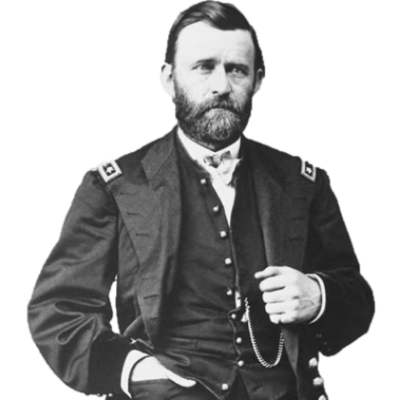General Grant

He was born Hiram Ulysses Grant, but his name was changed due to a clerical error in his first days at West Point. His friends just called him “Sam” and with his initials, he was sometimes called Uncle Sam Grant or just Uncle Sam. He was less than exemplary, graduating 21st out of 39 cadets, but performed well during the Mexican-American War. He received two citations for gallantry and one for meritorious conduct, but after the war in the monotony of his California duties far from his wife, he began neglecting his duties and drinking heavily. He resigned in 1854 because of an understanding commanding officer who let him resign rather than be booted out of the service. For the next six years he cleaned up his drinking and aimlessly led several short-lived pursuits while living with his wife. When the war began, he jumped at the opportunity of volunteering for the US Army and became colonel of the 21st Illinois infantry, quickly from there being promoted to brigadier general in July, and then given the District of Southeast Missouri in September 1861. In 1862, his victories at Fort Henry and Fort Donelson won him the nickname “Unconditional Surrender Grant,” but casualties at Shiloh made many fight for his release from command, but he was not released. In 1863, his strategic masterpiece in the capture of Vicksburg coupled with the eastern victory of Gettysburg helped turn the war in the favor of the North. Later in 1863, he cemented his reputation in the Battle of Chattanooga as he broke the stalemate there. In March 1864, Lincoln gave him the seldom rewarded position of Lieutenant General giving him command of all northern armies, in large part to bolster morale in the North. Unhindered by many of the frustrating cooperation problems with Washington, told to run the war as he wished as long as he would fight, he pursued his overland campaign to quickly defeat Robert E Lee, but Robert E Lee was not like other generals he had fought. It rather took him over a year of the hardest fighting of the war to defeat him. He declared his target was Lee, not Richmond, unlike popular northern sentiment. During his entire campaign, despite horrendous casualties he did not retreat once from the Rapidan River to the James to Appomattox, unlike the customary activity of other northern generals in late command of the army of the Potomac. He also directed Sherman in his victories over the west. Some of his more notable battles are the Battle of the Wilderness, Spotsylvania Courthouse, Cold Harbor, Petersburg, Five Forks, and the ultimate demise of the Army of Northern Virginia and the Government of the Confederate States of America. He was after the war elected the 18th president of the United States, and in close acquaintance with Mark Twain while writing his memoirs before his death.


 blade
blade melee
melee
 pierce
pierce ranged
ranged




















